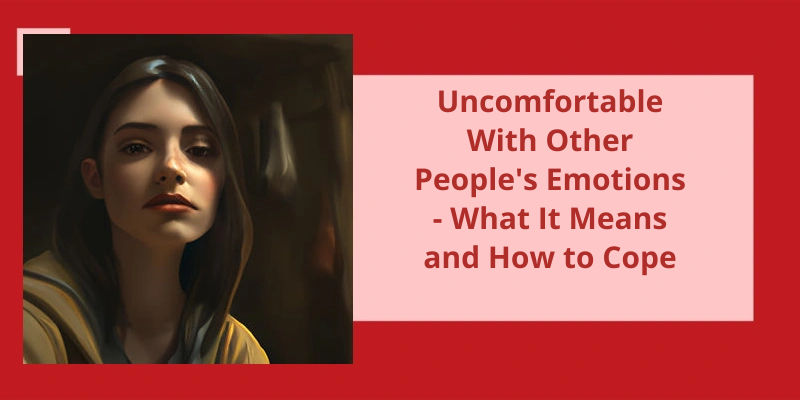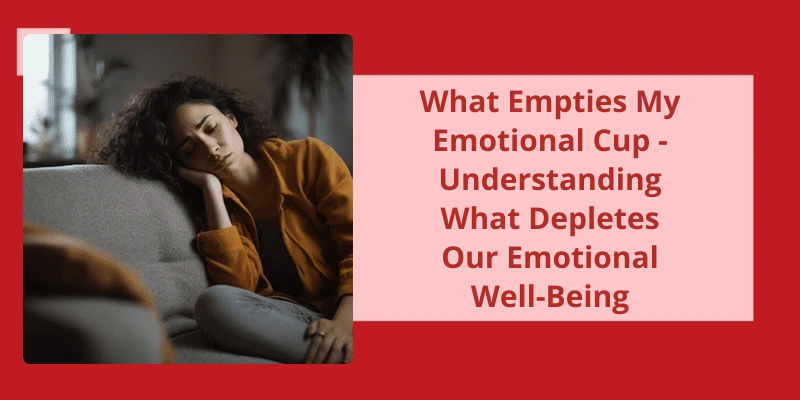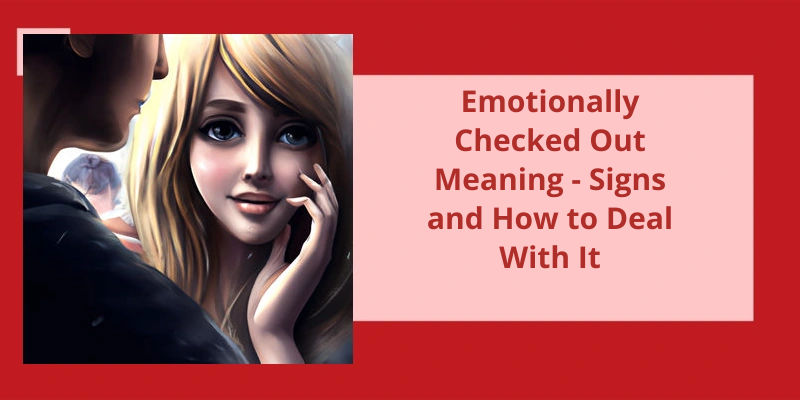Have you ever found yourself feeling overwhelmed or drained after spending time with someone, even if they didn't do anything particularly taxing? If so, you may be an empath – someone who’s hypersensitive to the emotions of others. For empaths, being around people who’re experiencing intense emotions can be particularly challenging. They’ve an innate ability to pick up on subtle cues that others might miss, and this can make them feel uneasy when they sense that someone isn’t being authentic. This can be difficult to navigate, as empaths may feel guilty for not being able to help, or they may feel like they’re absorbing other people's emotions. In this way, being an empath can be both a blessing and a curse. Understanding the unique challenges that come with being an empath can help you take better care of yourself and navigate your relationships more effectively.
Why Does Other People’s Emotions Make Me Uncomfortable?
To avoid those uncomfortable feelings, we tend to keep our emotions bottled up inside and prioritize rationality over emotions. But when we see someone else expressing their emotions, it triggers a fear that they’ll judge us the same way we judge ourselves. It challenges our perception of rationality and exposes our vulnerability. We worry about not knowing how to handle their emotions or being burdened by them.
Furthermore, societal norms sometimes dictate how much we share or hide our emotions. For example, being vulnerable and expressing sadness or fear as a man is often stigmatized, because society associates these emotions with weakness. As a result, men may feel uncomfortable around others expressing those emotions, including other men. Similarly, people from conservative cultures may feel uncomfortable around those who express emotions freely if it goes against their cultural norms. This discomfort is fueled by fear of judgment by society if they express their feelings in the same way as others.
This could be due to genetics, personal experiences, or upbringing. If someone grew up in an environment where emotions were frowned upon, they might struggle with sitting with those emotions and may subconsciously associate other peoples emotions with discomfort.
Lastly, it’s worth mentioning that some people thrive on drama. They might become uncomfortable when people arent expressing emotions, because they crave the drama and attention that comes with it.
This sensitivity to others’ emotions can be overwhelming and lead to feelings of anxiety or even physical symptoms. In this article, we’ll explore the science behind why some people are more susceptible to absorbing the emotions of others and provide tips on how to manage and protect yourself from emotional overload.
Why Do Other People’s Emotions Make Me Anxious?
This can be overwhelming, especially in situations where there are a lot of people in one place or when someone is expressing particularly strong emotions. Empaths might feel like they’re drowning in someone elses emotions, unable to escape or find relief.
In addition, empaths might struggle with setting healthy boundaries. They might feel like they need to help everyone and fix everything, even when it’s not their responsibility. This can lead to feelings of burnout, resentment, and even depression or anxiety. It’s important for empaths to learn how to say no and recognize when they need to take a step back from others emotions.
They might downplay their own feelings in order to maintain a sense of calm and stability for those around them. This can be exhausting, since it requires a lot of emotional labor and can lead to feelings of isolation and loneliness.
However, being an empath can also be a gift. Empaths are often able to connect deeply with others and offer a level of empathy and compassion that’s rare. They might be skilled at diffusing tense situations or helping others process difficult emotions. It’s important for empaths to recognize the value of their gifts, even as they work to manage the challenges that come with them.
Ultimately, if youre an empath, it’s important to prioritize your own well-being. This might mean setting boundaries with others, practicing self-care techniques, and seeking support from friends, family members, or a mental health professional. By learning to manage your emotions and set healthy boundaries, you can harness the power of your empathy and use it to benefit both yourself and those around you.
Source: Empaths and Anxiety: Is There a Connection? – Healthline
However, when they’re upset, angry, or anxious, it can feel like you’re drowning in a sea of negative emotions, leaving you feeling drained and overwhelmed. Learning how to cope with these intense feelings can be essential for empaths to maintain their mental and emotional well-being.
When Other People’s Emotions Overwhelm Me?
Likewise, when they feel sad or anxious, you also feel these negative emotions intensely. This can be both a gift and a curse. While your ability to connect with others on a deep emotional level can allow you to be a caring and compassionate friend, the constant emotional overload can be exhausting and overwhelming, leaving you feeling drained and burnt out.
When you find yourself catching second-hand emotions, it’s important to take a step back and remember that you aren’t responsible for other peoples feelings. It can be easy to fall into the trap of wanting to fix everything for everyone, but it’s important to recognize your own limitations and boundaries. Practicing self-care and setting boundaries can be helpful in managing your own emotional state.
One way to stay balanced is to practice mindfulness. Mindfulness allows you to focus on the present moment and observe your feelings without judgement. When you notice yourself getting swept away by someone elses emotions, take a deep breath and bring your attention back to your own body. Grounding techniques such as visualization or meditation can also help you stay centered.
Sharing your feelings with a trusted friend or therapist can also be helpful in managing overwhelming emotions. Externalizing your thoughts and feelings can help you process them and gain a new perspective. It’s important to surround yourself with supportive people who understand your empathic abilities and can offer validation and encouragement.
Lastly, it’s important to remember that being an empath isn’t a weakness, but rather a unique strength. Your ability to feel deeply and connect with others is a gift. By learning to manage your emotions, setting boundaries, and practicing self-care, you can continue to use your gift to make positive connections with others while maintaining your own sense of balance and well-being.
How to Distinguish Between Your Own Emotions and Those of Others
To distinguish between your own emotions and those of others, it’s important to practice self-awareness and mindfulness. This involves paying attention to physical sensations, thoughts, and feelings that arise within yourself and recognizing them as your own. It also involves observing others’ nonverbal cues, such as facial expressions and body language, to understand how they may be feeling. It’s important to not jump to conclusions and to communicate open-mindedly with others to gain a better understanding of their emotions.
There are several techniques you can use to manage other people’s emotions effectively. One of the most important is to replace judgment with curiosity. Additionally, you should stop problem-solving and start listening and put yourself in the other person’s shoes. Respond instead of reacting, and focus on controlling what’s in your circle of influence. By following these strategies, you can become adept at navigating other people’s emotions while maintaining healthy relationships with them.
How to Control Other Peoples Emotions?
When it comes to managing other peoples emotions, there’s a common misconception that we can control them. Instead, the best approach is to understand that we’re responsible for our own emotions and behaviors and therefore can’t be responsible for others. We can, however, influence their emotions and behavior through our interactions with them.
One way to influence others emotions positively is to replace judgment with curiosity. This means asking open-ended questions and trying to understand where the person is coming from instead of assuming we know what theyre feeling. By doing this, we show the person that we care about their emotions and are willing to listen without judgment.
Another way to manage other peoples emotions is to stop problem-solving and start listening. Often, someone who’s upset just wants to express their emotions without having someone try to fix their situation. By listening actively and acknowledging their feelings, we can help validate their emotions and provide support.
Putting on our own shoes refers to empathy- putting ourselves in another persons shoes. By doing this, we can better understand their emotions and experience and respond more appropriately. For example, if someone is going through a breakup, we can remember how we felt during our own breakups and provide empathy and support.
Responding versus reacting is a crucial part of managing other peoples emotions. When we react, we’re often responding instinctively without thinking about how our response will affect the other person. By taking a moment to respond thoughtfully, we can ensure that our response is more likely to have a positive impact on their emotions.
Our circle of influence includes what we’ve control over, such as our tone of voice, body language, and responses to situations. By focusing on what we can control, we can create a positive environment that promotes healthy emotional interactions.
Understanding Emotional Triggers and How to Avoid or Manage Them
Emotional triggers are external stimuli or situations that evoke a strong emotional reaction. They can range from a specific smell to a memory from the past. Identifying and understanding your triggers can help you avoid or manage them more effectively. Practicing mindfulness, self-reflection, and seeking professional help if necessary can also assist in managing emotional triggers.
As much as we appreciate and crave kindness, there’s a deep-rooted feeling of discomfort that arises when someone shows us genuine care and appreciation. This response can often cause confusion and guilt, leaving us to question the validity of our emotions. So, why does it make us uncomfortable when people are nice to us? Let’s explore this together.
Why Does It Make Me Uncomfortable When People Are Nice to Me?
In todays society, where many interactions are transactional and superficial, genuine kindness can feel disorienting. When someone displays genuine interest or compassion towards us, it can activate feelings of vulnerability and self-doubt. We may wonder what this person wants from us or what their intentions are, especially if we don’t expect such behavior from them.
Moreover, some individuals may have experienced hurtful or abusive relationships in the past, which can make it difficult for them to trust others and accept kindness at face value. They may have become conditioned to expect the worst from others, leading them to feel suspicious or defensive when someone tries to treat them nicely.
For others, the discomfort may stem from a fear of dependency or obligation. If we’re accustomed to being self-sufficient, receiving help or kindness from others can feel like a loss of control or autonomy. We may worry that accepting help or kindness will make us feel indebted, weak, or obligated to reciprocate in some way. This can lead to feelings of anxiety or guilt, which can make it difficult to enjoy the genuine goodwill of others.
In some cases, a persons discomfort may also be rooted in feelings of unworthiness or inadequacy. If we’ve a negative self-image or low self-esteem, we may struggle to believe that we deserve kindness or positive attention. We may feel that others are being insincere or “too good to be true,” leading to an internal conflict between our desire for validation and our self-doubt.
Ultimately, the discomfort that many people feel when someone is kind to them is a complex and multifaceted issue. It can be influenced by a wide range of psychological, social, and cultural factors, making it difficult to pinpoint any one specific cause. Nonetheless, by being mindful of our own feelings and willing to explore them with openness and curiosity, we can begin to develop greater self-awareness and acceptance, leading to more fulfilling and meaningful relationships with others.
However, for some individuals, these heightened empathetic abilities can lead to feeling overwhelmed or anxious in social situations. In this article, we will delve deeper into the reasons behind why other people’s emotions may bother you and provide some tips for managing this sensitivity.
Why Do Other People’s Emotions Bother Me?
SPS can lead to feeling overwhelmed in conflict or chaotic situations; picking up other peoples moods and emotions more easily and deeply than others; and feeling easily drained by social interactions or crowded environments. These characteristics can lead to a heightened sensitivity to others emotions, which can explain why other peoples moods may bother you more than they bother other people.
Another possible explanation for why you might be bothered by other peoples emotions is that you tend to take on other peoples problems as your own. This is common in people with a strong sense of empathy, who may feel compelled to help others even when it’s not necessary or appropriate. Learning to set boundaries and recognize when you’re taking on too much emotional burden can help you deal with other peoples emotions in a healthier way.
When we’re experiencing difficult emotions like anxiety, anger, or sadness, it can be easy to become more reactive to others moods. This can create a cycle where you feel increasingly overwhelmed by other peoples emotions while also struggling to manage your own. In these cases, it’s important to prioritize your own emotional well-being by practicing self-care and seeking support from a therapist or other mental health professional.
Another factor to consider is the broader cultural context in which you live. We’re all influenced by societal norms and attitudes towards emotions, which can vary widely depending on the culture we live in. In some societies, for example, people are encouraged to express their emotions openly, while in others, emotions may be seen as a sign of weakness or vulnerability. These cultural expectations can shape how we see ourselves and others, and can influence how comfortable we feel around others when they’re experiencing strong emotions.
It’s important to take the time to reflect on your own experiences and feelings, and to seek out support and guidance if you find that your emotional sensitivity is getting in the way of your relationships and daily life. With patience, self-awareness, and the right resources, it’s possible to learn to manage your emotional sensitivity in a way that helps you connect more deeply with others while also taking care of yourself.
Conclusion
In conclusion, being uncomfortable with other people's emotions can be a difficult experience for those who possess empathic qualities. The hypersensitivity of empaths often causes them to feel uneasy or distressed by inauthentic behavior from others. Despite this, the ability to pick up subtle clues about other people's emotions can be beneficial in building stronger relationships and fostering empathy. While it may be challenging to navigate at times, learning to manage and understand these emotions can lead to greater personal growth and emotional intelligence. Ultimately, empathy and understanding have the power to create more meaningful connections with those around us, making it a valuable trait to nurture and cultivate.






